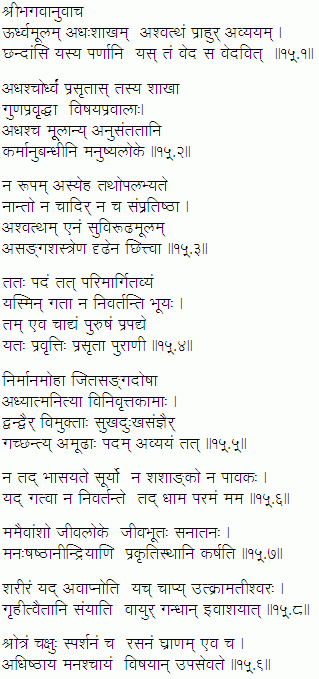
I have the right to enhance my possessions and maximize my enjoyment.” The reverse of this is Spiritual consciousness, which is characterized by thoughts such as, “God is the owner and enjoyer of this entire world. “God is the Master of the entire creation all moving and non-moving beings are his servants.” Material consciousness is characterized by the following manner of thoughts, “I am the proprietor of all that I possess. Śhrīmannārāyaṇa swāmī jagatānprabhurīśhwaraḥ (Padma Puran) The individual soul is a tiny part of God (verse 15.7), and hence our inherent nature is to serve him through all our actions.ĭāsa bhūtamidaṁ tasya jagatsthāvara jangamam

While performing these actions, we must remember that we are not the enjoyers of the results-the results are meant for the pleasure of God. Having come into this world, we all have various duties determined by our family situation, social position, occupation, etc. To perform actions is an integral part of human nature. The fruits of your actions are not for your enjoyment. Additionally, with their complete focus on the shot being played, their game would be raised to a higher level. Now if they could merely focus on playing the shots to the best of their ability, they would find it the most enjoyable game of golf they have ever played. When people play golf, they are engrossed in the fruits-whether their score is under par, over par, etc. Consider its application to a simple everyday activity such as playing golf. The fact is that when we are unconcerned about the results, we are able to focus entirely on our efforts, and the result is even better than before.Ī humorous acronym for this is NATO or Not Attached to Outcome. So Shree Krishna advises Arjun to give up concern for the results and instead focus solely on doing a good job. Now if we become anxious for results, we will experience anxiety whenever they are not according to our expectations. A number of factors come into play in determining the results-our efforts, destiny (our past karmas), the will of God, the efforts of others, the cumulative karmas of the people involved, the place and situation (a matter of luck), etc.

We have the right to do our duty, but the results are not dependent only upon our efforts.

4) Do not be attached to inaction.ĭo your duty, but do not concern yourself with the results. 3) Even while working, give up the pride of doership. 2) The fruits of your actions are not for your enjoyment. The verse gives four instructions regarding the science of work: 1) Do your duty, but do not concern yourself with the results. It offers deep insight into the proper spirit of work and is often quoted whenever the topic of karm yog is discussed. This is an extremely popular verse of the Bhagavad Gita, so much so that even most school children in India are familiar with it.


 0 kommentar(er)
0 kommentar(er)
